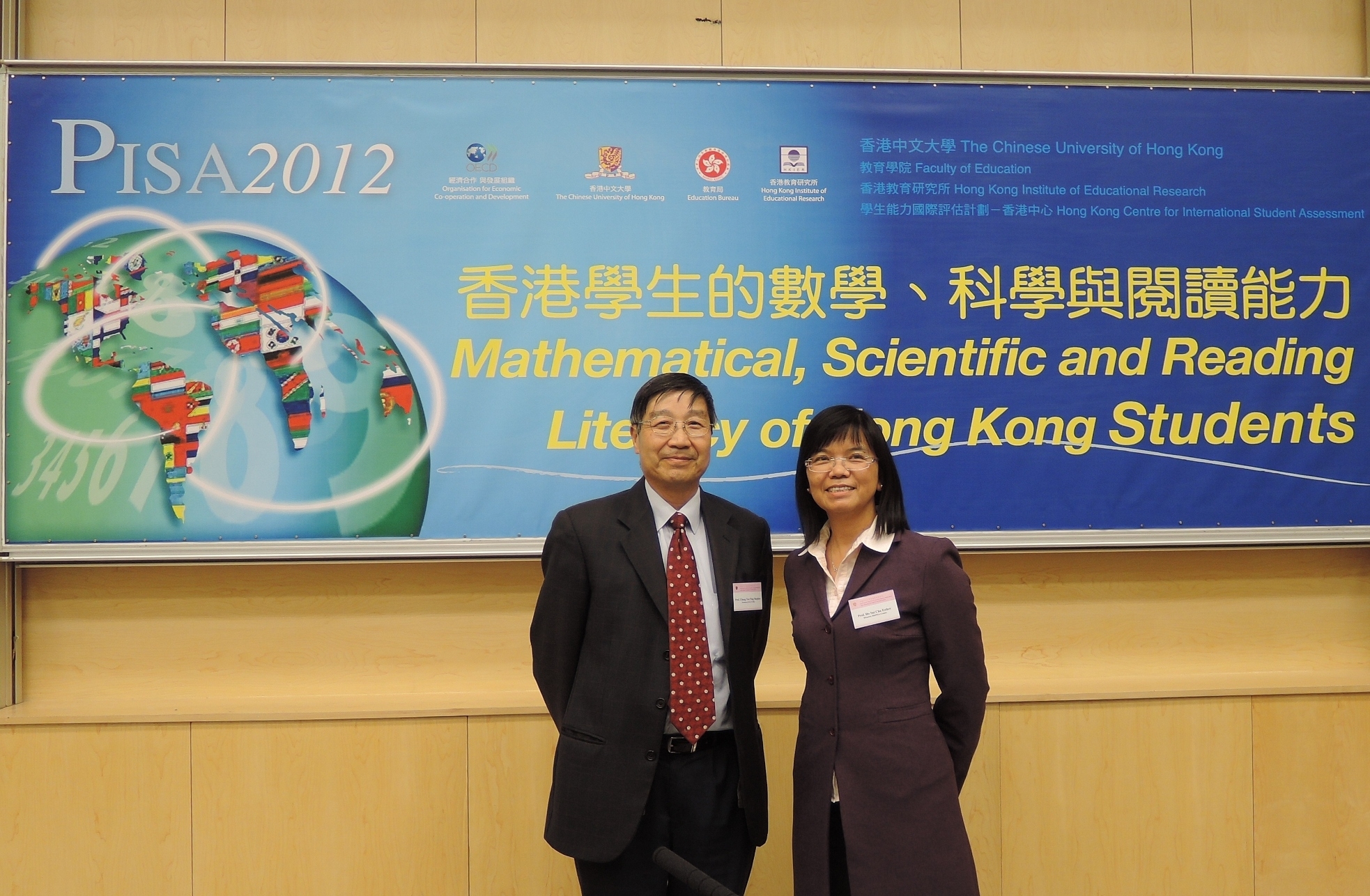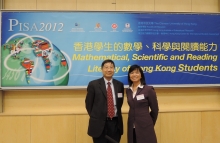CUHK
News Centre
CUHK Releases the Results ofProgramme for International Student Assessment 2012
The Hong Kong Centre for International Student Assessment of the Hong Kong Institute of Educational Research at The Chinese University of Hong Kong (CUHK) released the survey results of Programme for International Student Assessment 2012 (PISA 2012) today (3 December). During April to May 2012, about 5,000 students from 148 schools including government, aided and independent schools were randomly selected for the assessment of student performance in mathematics, science and reading.
The survey reveals that Hong Kong 15-year-old students again stand in the top tier among 65 countries and regions. Specifically, Hong Kong students rank third in mathematics and second in both reading and science (Figure 1 and Appendix 1). Regarding equity in education, the difference in performance between students of different socio-economic background changes little when compared with the first PISA survey in Hong Kong. The difference in student performance between schools is getting smaller but remains significant. The impact of socio-economic status (SES) aggregated at school level is considerably reduced. Taking together, these changes suggest that the basic education of Hong Kong is heading toward a quality education with equality. However, it is found that the within-school difference of student performance has increased (Figure 2), suggesting that the academic ability of students within school is more diverse. As such, how secondary school teachers should equip themselves, and what support measures the education authority should provide schools in order to take care of the increased learning diversity of students in schools would be the timely agenda.
Equality in education in terms of how students’ SES, gender, and immigrant status affect their performance in schools is examined. It is found that the impact of students’ SES including occupation and education level of their parents has relatively small impact on their performance (Figure 3 and Appendix 2). Yet significant gender difference is still evident in the performance of both mathematics and reading. Boys outperform girls by 15 points in mathematics and girls outperform boys by 25 points in reading (Figure 4). Both differences are statistically significant. Also, the performance of immigrant students who were born outside Hong Kong is significantly poorer than that of local-born students, with a difference up to 20 to 26 points (Figure 5). The disadvantage of immigrant students appears to reduce over time but is still significant.
Various outcomes of students’ self-related cognition are also examined. Results show that students’ self-efficacy and self-concept in mathematics have improved from 2003 to 2012. Yet, the self-concept in mathematics of Hong Kong students is still lower than the OECD average. Students’ anxiety towards learning mathematics is still higher than the OECD average in spite of their top performance in mathematics among the 65 participating countries and regions (Figure 6).
Regarding parental factors, parents’ investment, involvement and perception of school quality are found to be correlated with their children’s mathematics performance. Parents’ involvement in child’s education at home has a positive impact on the learning outcomes. If a parent spends more time talking to their children at home (e.g. discuss current affairs, movies or television programmes, books or school life with the child), the child tends to perform better. However, parents’ involvement in school such as acting as parent volunteers or attending parental programmes is found to be negatively correlated with students’ performance. One possible explanation of this negative relationship could be that at the stage of secondary education, parents’ contact with school or involvement in school activities are quite often initiated by students’ behavioral or academic problems. In other words, parents’ involvement in school is largely problem-oriented. This undesirable condition needs to be further explored for improvement (Figure 7). As an evaluator of school quality, the more parents are satisfied with their children’s school, the more students tend to have better performance.
The survey has also collected data concerning other educational issues such as student motivation and school climate (Figure 8). These will be further studied and reported.
Organised by the Organisation for Economic Co-operation and Development (OECD), PISA compares and evaluates the effectiveness of education systems by assessing how well 15-year-olds approaching the end of compulsory education have acquired the knowledge and skills essential for participation in society. The assessment is conducted every three years.





